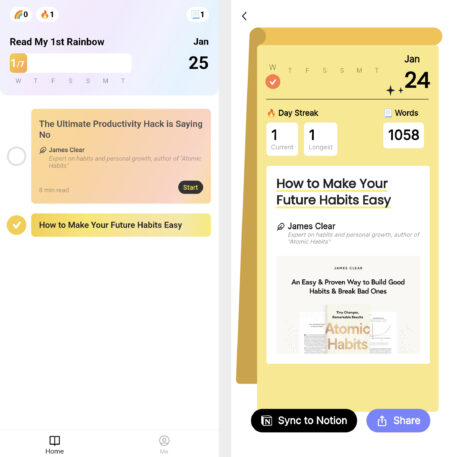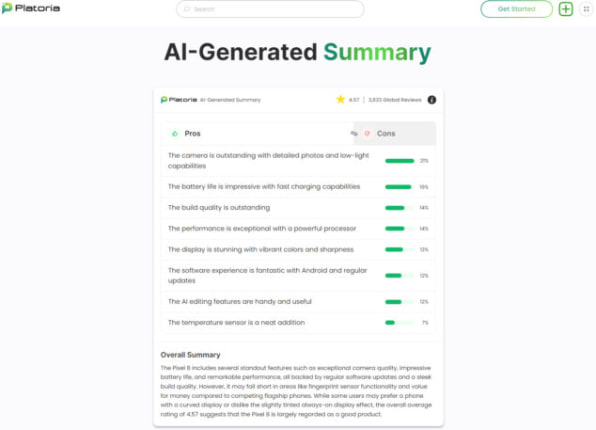When it comes to artificial intelligence in 2024, two things are undeniably true:
- AI is incredibly exciting right now, and companies are cooking up some mind-bogglingly futuristic concepts.
- AI is also almost comically overhyped, and many of the “innovations” of the moment are about using a trendy buzzword more than offering anything with actual real-world value.
It’s impossible to follow tech news and not feel the push and pull of those two competing realities. But while it’s easy to get lost in the flood of also-ran, uninspired “AI” features (seriously, does anyone really need yet another place to generate low-quality robo-text?!), it’s also entirely possible to find thoughtful, intelligent implementations of AI that’ll save you time and make your life easier.
By and large, the AI apps I’ve found to be most valuable aren’t the sprawling, use-AI-for-everything-imaginable sorts of creations that are popping up left and right these days. Instead, they’re, well, tiny—narrow, single-purpose tools that lean on AI to help you accomplish one super-specific task. They’re really effective at what they do, and you might just be blown away by just how much of a difference they can make in your day-to-day duties.
Here are three such tiny AI tools that are well worth your while to explore.
1. AudioPen: smarter thought storing
Perhaps my favorite AI app so far and the one that’s offered the most practical value for my life is a simple little service called AudioPen.
AudioPen relies on AI to help extract thoughts from your perpetually overflowing head. You simply press a big orange mic button within the app and start talking. You could ramble on about anything imaginable—ideas for a work project, ingredients for a winter stew, or whatever happens to be on your mind at any given moment.
Once you’ve finished, you press a stop button—and within a matter of seconds, AudioPen will boil all your jibber-jabber down into the most important points and give you a neatly organized plain-text summary of everything you said.
It works in multiple languages, too, and can even translate your thoughts into a different dialect, if you want.
AudioPen is completely web-based, which means it works on any device and platform. You can also install it as a progressive web app with browsers that offer that option. Doing so creates an easy-access icon on your desktop or home screen and gives you an app-like experience for using the service.
AudioPen is free for recordings up to three minutes in length and with up to 10 stored notes at a time. You can lift those limits and enable a bunch of advanced options, including full text search across your saved notes and “SuperSummaries” that combine multiple notes into a single short digest, with a $75-a-year or $120-for-two-years AudioPen Prime subscription.
2. Readbay.ai: smarter reading
I’ll admit it: I save all sorts of articles to read later—and then rarely ever end up getting around to actually reading most of them. It’s an all-too-common condition in our content-rich online universe. And an AI-infused app called Readbay.ai is ready to help.
Readbay.ai isn’t another read-it-later app. In fact, you can’t even save stuff into it on your own. Instead, it’s a collection of well-regarded articles around all sorts of productivity-related subjects—everything from gaining deeper understandings of AI’s inner workings to accomplishing career goals and making the most of your focused work hours. Every day, it serves up a single new article based on your initial self-made selections, and it encourages you to read that one article and nothing more. While the field of covered subjects is relatively narrow, the app serves up no shortage of enticing materials in areas revolving around life improvements and gaining a deeper understanding of complex, often-technical topics.
Readbay.ai also gives you tools for saving highlights as you go and for adding in your own thoughts and reactions—all of which can be stored within the service itself as well as synced to Notion, if you’re so inspired. And on the AI front, it offers a thoughtfully integrated GPT-4-powered coach that suggests questions for further thinking whenever you start making notes—using the text you highlight as a springboard for practical, personal application of the information. Its prompts analyze each snippet and encourage you to explore the associated ideas and come up with specific ways to apply them to your life.

Readbay.ai is free to use in its base form, though you’ll need to upgrade to a premium plan at $9 a month or $70 a year to gain unlimited access to the coach feature, eliminate ads, and get other benefits.
3. Platoria: smarter shopping
Last but not least in our list of tiny-yet-mighty AI tools is Platoria, a service that lets you search for any product and see a supremely helpful summary of its reviews from all around the web—while simultaneously getting the best available deals and seeing how the product stacks up to competitors.
The service is completely web-based and easy as can be to use: You just type the name of any product into the search box on its home page, find and confirm the exact specific item you want, and—well, that’s pretty much it.
The site will serve up an overall review summary along with a list of retailers currently carrying the product and how much they’re charging. Scroll down a skosh, and you’ll see an AI-powered breakdown of the product’s pros and cons as well as an overall summary based on reviews from sites such as Amazon, Best Buy, and Target (among many others).

If you want to dive deeper, the site offers a product-determined Q&A area that answers specific questions based on common points brought up throughout the reviews. With a phone, for instance, you might see questions about the device’s key features, its screen quality, or how its various available models compare. With a vacuum, you might be shown questions around the product’s effectiveness on different types of floors, its weight, and its effectiveness at cleaning up after pets.
Platoria focuses primarily on tech products, but what’s especially cool is that the site lets you add virtually any product imaginable into its database, on demand, if it isn’t already there. It then takes a minute or so for it to collect and compile all the pertinent info and present you with a page.
Platoria is free to use. (The service seems to make its money via affiliate codes on its outbound product links along with partnerships that allow retailers to feature its data.) You can access most of its features without creating an account or providing any manner of personal information, too, though the custom product-adding option does require a sign-in.
Like our other two tools, its focus may be narrow and its purpose specific—but that’s exactly why it’s such an effective and enjoyable tool to use.
Discover all sorts of exceptional tech tools with my free Cool Tools newsletter at The Intelligence. You’ll get a new off-the-beaten-path treasure in your inbox every Wednesday!
Connectez-vous pour ajouter un commentaire
Autres messages de ce groupe

Alphabet’s Google has been hit by an EU antitrust complaint over its

I have not found much joy in iPhone photography of late. Between the flat,

Far-right extremists are exploiting TikTok’s “use-this-sound” feature as a Trojan


The role of the CFO is evolving—and fast. In today’s volatile business environment, finance leaders are navigating everything from unpredictable tariffs to tightening regulations and rising geopol

In June, Google released its newest smartphone operating system, Android 16. The same month, Apple previewed its next smartphone oper

